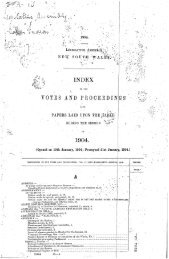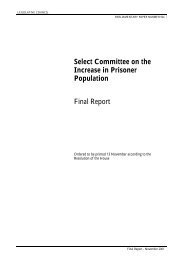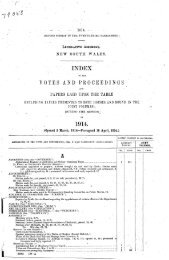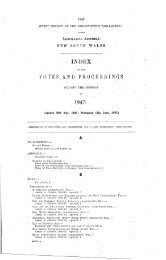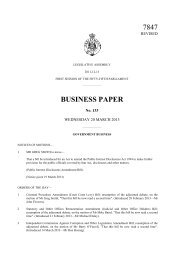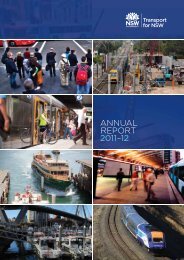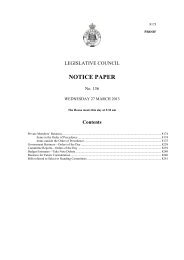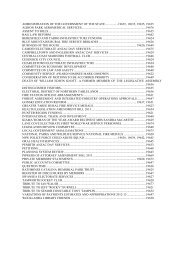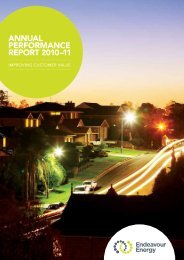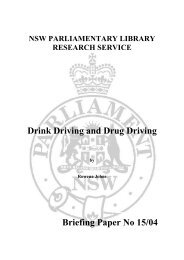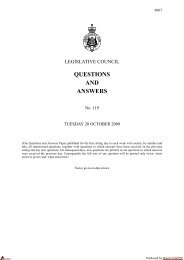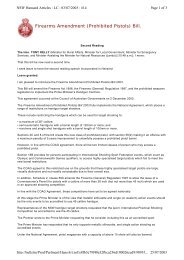Questions & Answers Paper No. 158 - Parliament of New South ...
Questions & Answers Paper No. 158 - Parliament of New South ...
Questions & Answers Paper No. 158 - Parliament of New South ...
Create successful ePaper yourself
Turn your PDF publications into a flip-book with our unique Google optimized e-Paper software.
7029<br />
LEGISLATIVE ASSEMBLY QUESTIONS AND ANSWERS<br />
MONDAY 12 OCTOBER 2009<br />
1 SEPTEMBER 2009<br />
(<strong>Paper</strong> <strong>No</strong>. 147)<br />
*7296 DISCHARGE OF PATIENTS—WAITING TIMES—Mr Richard Amery asked the Deputy Premier,<br />
Minister for Climate Change and the Environment, and Minister for Commerce representing the Attorney<br />
General, Minister for Industrial Relations, Minister for Health, Minister for the Central Coast, Vice<br />
President <strong>of</strong> the Executive Council—<br />
(1) After a patient has been cleared by a doctor to be discharged from a public hospital in <strong>New</strong> <strong>South</strong><br />
Wales, do patients wait in a waiting area for their discharge papers to be processed?<br />
(2) (a) Does the Department <strong>of</strong> Health set benchmark times as an acceptable waiting time for such<br />
patients to be discharged, once given clearance by a doctor?<br />
(b) If so, what are these benchmark times?<br />
(3) Is a waiting time (for a patient's discharge papers to be processed) <strong>of</strong> five hours considered<br />
acceptable by the Department <strong>of</strong> Health?<br />
Answer—<br />
I am advised:<br />
(1) Various strategies exist to manage patients waiting for family, medications or discharge letters. These<br />
range from waiting in the bed in their room, to a ward waiting room, to an organised discharge<br />
lounge or unit where the discharge processes are coordinated and finalised.<br />
(2) All Area Health Services have designated times the patients should be ready to leave on the day <strong>of</strong><br />
discharge. <strong>No</strong> measure <strong>of</strong> the length <strong>of</strong> time patients wait after the decision to discharge is currently<br />
measured.<br />
(3) Waiting times for the processing <strong>of</strong> patients' discharge papers varies depending on the circumstances<br />
<strong>of</strong> each individual case. NSW Health is working with staff on improving communication with<br />
patients and carers to explain to them what is happening with their care; to improve the existing<br />
systems; and build new ones to assist in identifying and reducing delays.<br />
*7297 PORTABLE OXYGEN—Mr Steve Cansdell asked the Deputy Premier, Minister for Climate Change and<br />
the Environment, and Minister for Commerce representing the Attorney General, Minister for Industrial<br />
Relations, Minister for Health, Minister for the Central Coast, Vice President <strong>of</strong> the Executive Council—<br />
(1) Why is NSW the only state or territory that gives no assistance to the disabled for the acquisition <strong>of</strong><br />
portable oxygen?<br />
(2) Would it not be practical to replace all home oxygen concentrators with portable concentrators?<br />
(3) Can the Minister advise what the waiting list is for the supply <strong>of</strong> home oxygen equipment in the<br />
Clarence electorate?<br />
Answer—<br />
(1) NSW does provide assistance with the provision <strong>of</strong> portable oxygen. The NSW Home Oxygen<br />
Service (HOS) provides respiratory equipment, including oxygen concentrators and portable oxygen<br />
to assist people to manage their respiratory condition at home.<br />
(2) The current Home Oxygen Contract expires in 2010 at which time the efficacy <strong>of</strong> including portable<br />
oxygen concentrators on the contract will be considered.<br />
(3) There is currently no waiting time in the <strong>No</strong>rth Coast Area Health Service (which includes the<br />
Clarence electorate) for people who meet the eligibility criteria for home oxygen therapy equipment.<br />
*7298 MONITORING OF UNDERGROUND FUEL TANKS—Mr Steve Cansdell asked the Deputy Premier,<br />
Minister for Climate Change and the Environment, and Minister for Commerce—<br />
In regard to the introduction <strong>of</strong> legislation requiring all underground fuel tanks to be monitored:<br />
(1) Is the Minister aware <strong>of</strong> the service costs for this monitoring and the added financial hardship this<br />
will place on already struggling small businesses?<br />
(2) Are there any subsidies or fee exemptions available for those small businesses facing financial<br />
hardship because <strong>of</strong> the introduction <strong>of</strong> this monitoring service?<br />
(3) Why is it necessary that the fuel tanks be monitored monthly instead <strong>of</strong> quarterly?<br />
(4) Has the Government undertaken any business impact or cost analysis study on the impact this<br />
regulation will have on small business?<br />
Answer—<br />
Produced by Alts<strong>of</strong>t Xml2PDF



